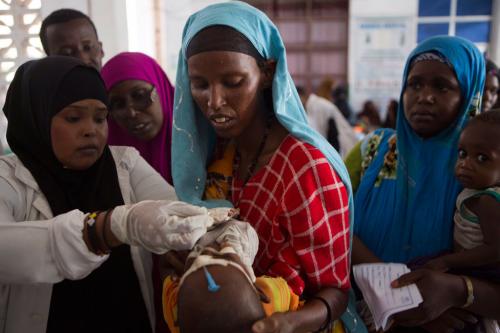Somalia: UN-backed cholera vaccination campaign targets 450,000 peopl
The Government of Somalia has launched an oral cholera vaccination (OCV) campaign with the support of the United Nations health agency, targeting over 450,000 people in seven high-risk areas around the country on Mar 16.

Health workers vaccinate children in the first oral cholera vaccination campaign at the Banadir Hospital in Mogadishu, Somalia.
The first-ever OCV campaign to be conducted in the country comes at a critical time after Somalia announced the ongoing drought as a national disaster and faces the possibility of another famine, according to a news release issued the day before by the World Health Organization (WHO).
“This is one of the largest oral cholera vaccination campaigns conducted in Africa,” said Ghulam Popal, WHO Representative in Somalia. “This vaccination campaign will contribute to the reduction in the number of new cholera cases, interrupt transmission and limit the spread of cholera,” he said.
Somalia is currently experiencing a large-scale outbreak of cholera with roughly 11,000 cases and 268 deaths reported in 11 regions since the beginning of 2017. This is more than half the number of cases reported for 2016.
Somalia has long experienced a humanitarian emergency due to conflict, insecurity, displacement of people and limited access to health system. This situation is further compounded by drought, malnutrition and lack of access to clean water and sanitation facilities. If the current drought and food insecurity continue, the number of cholera cases is likely to increase. Preventative measures such as oral cholera vaccine can mitigate these numbers, and save lives.
The campaign is being held in select communities in Mogadishu, Kismayo and Beledweyne through a combination of fixed and mobile sites for maximum accessibility by the communities. The vaccines, which will be administered to at-risk persons aged one year or older, are being delivered in 2 rounds. The first round of the campaign has commenced on Mar 16 and will continue until 19 March, and the second round of the campaign will be held from 18 to 22 April.
The response efforts by the Ministry of Health, WHO, UN Children's Fund (UNICEF) and health partners have included active case search, effective case management, intensive household chlorination campaign, and community awareness.
Source:United Nations
- 325 reads
Human Rights
Ringing FOWPAL’s Peace Bell for the World:Nobel Peace Prize Laureates’ Visions and Actions

Protecting the World’s Cultural Diversity for a Sustainable Future

The Peace Bell Resonates at the 27th Eurasian Economic Summit

Declaration of World Day of the Power of Hope Endorsed by People in 158 Nations

Puppet Show I International Friendship Day 2020

